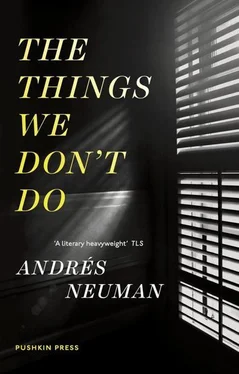Andrés Neuman
The Things We Don't Do
PRAISE FOR Traveller Of The Century Shortlisted for the 2013 Independent Foreign Fiction Prize and the 2014 International IMPAC Dublin Literary Award
“A beautiful, accomplished novel: as ambitious as it is generous, as moving as it is smart”
Juan Gabriel Vásquez, Guardian
“Rarely comes a novel that blends poetry, history, philosophy, semantics, politics, a murder mystery — and love, that too — with such skill… Neuman takes his readers on a literary pilgrimage, back to the essence, and reminds us why we loved stories so much even as little children”
Elif Shafak
“A big, utterly captivating murder mystery and love story, full of history and politics and the hottest sex in contemporary fiction”
Daily Telegraph
PRAISE FOR
Talking to Ourselves
“Simple, profound, heartbreaking”
The New York Times
“This is writing of a quality rarely encountered, which actually feels as though it touches on reality, translating something experienced into words, without loss of detail or clarity… When you read Neuman’s beautiful novel, you realize a very high bar has been set”
Guardian
“Andrés Neuman’s gem of a novel… is a profound meditation on illness, death and bereavement and brilliantly illustrates literature’s ability to help readers confront and understand mortality… Neuman is a master craftsman”
Independent on Sunday
“The book does not attempt to find coherence beyond each narrator’s individual account, which is precisely what makes it so affecting”
Times Literary Supplement
MY NAME IS MARCOS. I always wanted to be Cristóbal. I don’t mean I wanted to be called Cristóbal. Cristóbal is my friend; I was going to say my best friend, but I have to confess he is the only one.
Gabriela is my wife. She loves me a lot and sleeps with Cristóbal.
He is intelligent, self-assured, an agile dancer. He also rides. Is proficient at Latin grammar. Cooks for women. Then eats them for lunch. I would say that Gabriela is his favourite dish.
Some uninformed person might think my wife is betraying me: nothing could be further from the truth. I have always wanted to be Cristóbal, but I do not simply stand there watching. I practise not being Marcos. I take dancing lessons and pore over my student textbooks. I am well aware my wife adores me. So much so that the poor thing sleeps with him, with the man I wish to be. Nestling against Cristóbal’s muscular chest, my Gabriela is anxiously awaiting me, arms open wide.
Such patience on her behalf thrills me. I only hope my efforts meet her expectations, and that one day soon our moment will come. That moment of unswerving love that she has been preparing so diligently, cheating on Cristóbal, getting accustomed to his body, his character and his tastes, so that she will be as comfortable and happy as can be when I am like him and we leave him all alone.
RUTH WAS making mountains with her foot. She dug her big toe into the warm sand, formed small mounds, tidied them, carefully smoothed them with the ball of her foot, contemplated them for a moment. Then she demolished them. And began all over again. Her insteps were reddish, they glowed like solar stones. Her nails were painted from the night before.
Jorge was digging out the umbrella, or trying to. Someone should buy a new one, he muttered as he grappled with it. Ruth pretended not to be listening, but she couldn’t help feeling annoyed. It was a trivial remark like any other, of course. Jorge clicked his tongue and jerked his hand away from the umbrella: he had pinched his finger in one of the struts. A trivial remark, Ruth reflected, but the point was he hadn’t said “we should buy”, but rather “someone should buy”. In one go, Jorge managed to fold the umbrella, and stood there staring at it, hands on hips, as if awaiting some final response from a vanquished creature. Arbitrary or not, there it was, he had said “someone” and not “we”, Ruth thought.
Jorge held the umbrella poised. The tip was streaked with tongues of rust and caked in wet sand. He glanced at Ruth’s miniature mountains. Then his eyes rested on her feet blistered from her sandals, moved up her legs to her belly, lingered on the folds gathered round her navel, his gaze continued up her torso, passed between her breasts as though crossing a bridge, leapt to her mass of salty hair, and finally slid down to Ruth’s eyes. Jorge realized that, reclining in her deckchair, shading her eyes with one hand, she had been observing him for some time as well. He felt slightly embarrassed without knowing quite why, and he smiled, wrinkling his nose. Ruth thought this gesture was exaggerated, because he was not facing the purple sun. Jorge raised the umbrella like an unwieldy trophy.
“So, are you going to help me?” he asked in a voice that sounded ironic even to him, less benign than he had intended. He wrinkled his nose again, turned his gaze to the sea for an instant, and then heard Ruth’s startling reply:
“Don’t move.”
Ruth was gripping a wooden racket. The edge of the racket was resting on her thighs.
“Do you want the ball?” Jorge asked.
“I want you not to move,” she said.
Ruth lifted the racket, sat up straight and reached out an arm in order to slowly trace a line in the sand. It was not a very even line, about a metre long, separating Ruth from her husband. When she had finished drawing it, she let go of the racket, lay back in the deckchair and crossed her legs.
“Very pretty,” Jorge said, half-curious and half-irritated.
“Do you like it?” Ruth replied. “Then don’t cross it.”
A damp breeze was beginning to rise on the beach, or Jorge noticed it at that moment. He had no wish to drop the umbrella and the other stuff he was carrying over his shoulder. But above all he had no desire whatsoever to start playing silly games. He was tired. He hadn’t slept much. His skin felt sweaty, gritty. He was in a hurry to shower and go out and have dinner.
“I don’t understand,” said Jorge.
“I can imagine,” said Ruth.
“Hey, are we going or not?”
“You can do what you want. But don’t cross the line.”
“What do you mean, don’t cross it?”
“I see you understand now!”
Jorge dropped the things; he was surprised they made so much noise as they landed on the sand. Ruth jumped slightly, but didn’t stir from her deckchair. Jorge examined the line from left to right as if something were written on it. He took a step towards Ruth. He saw how she tensed and clutched the arms of the chair.
“This is a joke, right?”
“This couldn’t be more serious.”
“Look, darling,” he said, halting at the line. “What’s the matter with you? What are you doing? Can’t you see everyone else is leaving? It’s late. It’s time to go. Why can’t you be reasonable?”
“Am I not reasonable because I’m not leaving when everyone else does?”
“You’re not reasonable because I don’t know what’s the matter with you.”
“Ah! How interesting!”
“Ruth…” Jorge sighed, making as if to go over and touch her. “Do you want us to stay a bit longer?”
“All I want,” she said, “is for you to stay on that side.”
“On what side, damn it?”
“On that side of the line.”
Ruth recognized a flash of anger in Jorge’s sceptical smile. It was only a fleeting twitch of his cheek, a hint of indignation he was able to control by feigning condescension; but there it was. Now she had him. It suddenly seemed it was now or never.
Читать дальше












